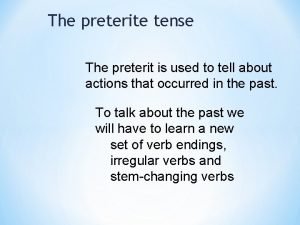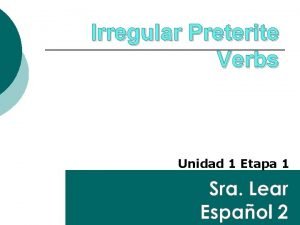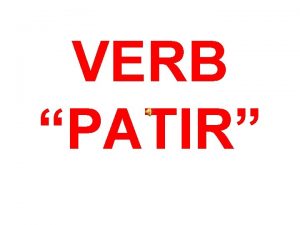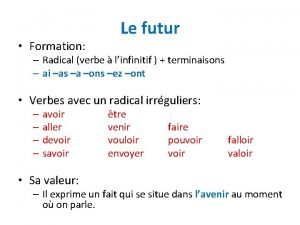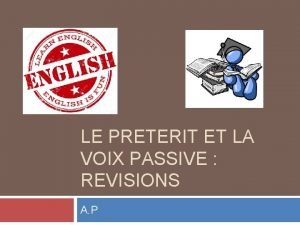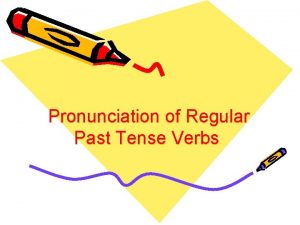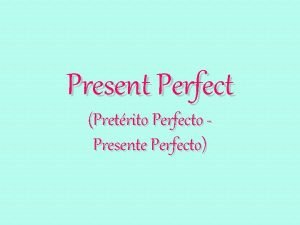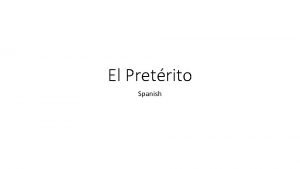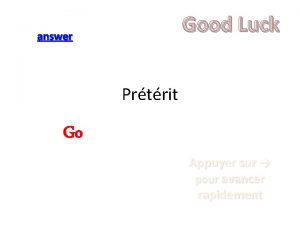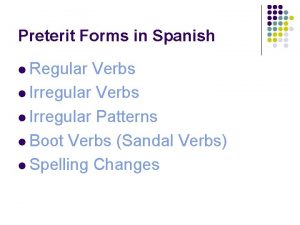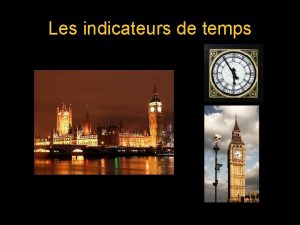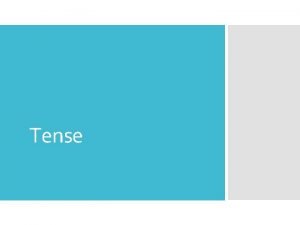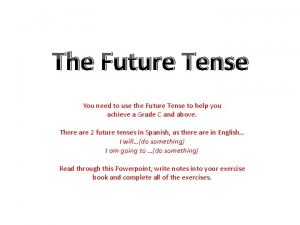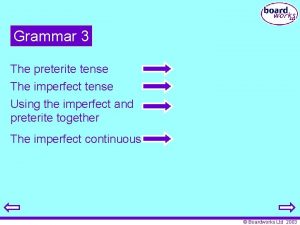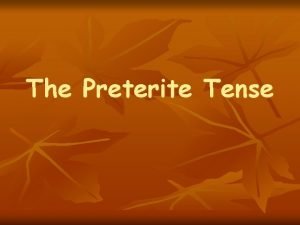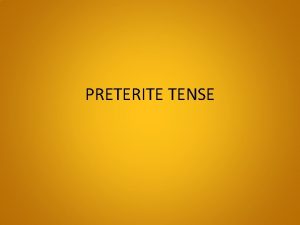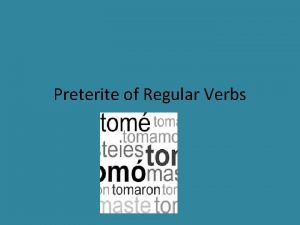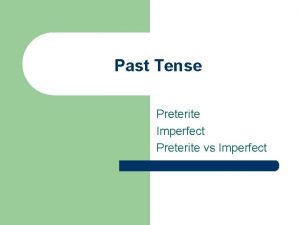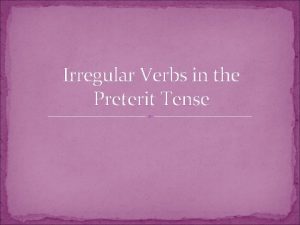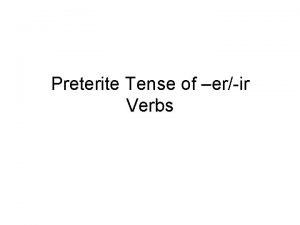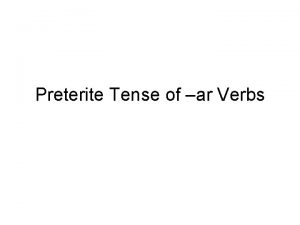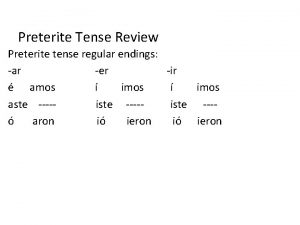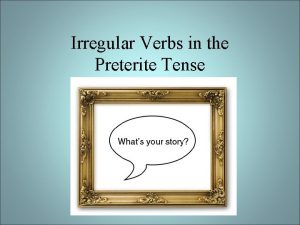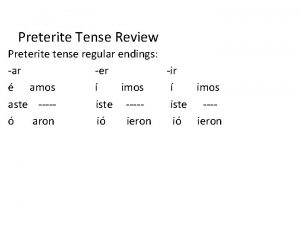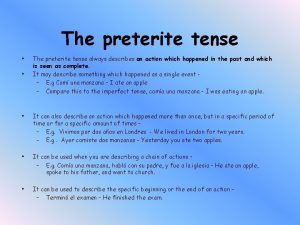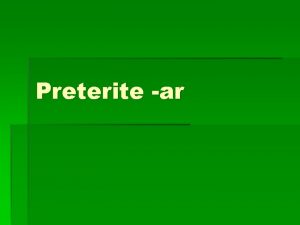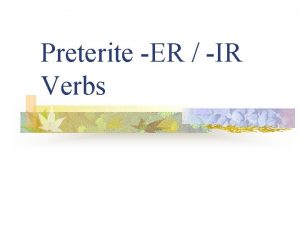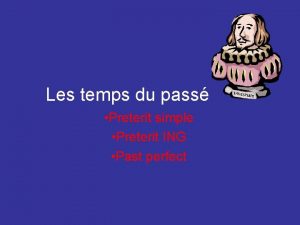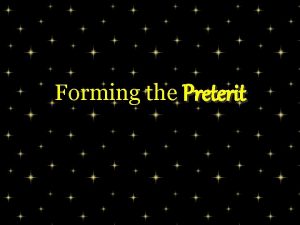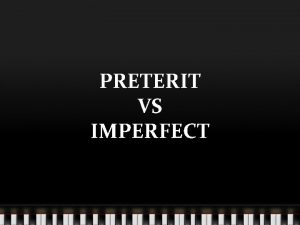The preterite tense The preterit is used to



















- Slides: 19

The preterite tense The preterit is used to tell about actions that occurred in the past. To talk about the past we will have to learn a new set of verb endings, irregular verbs and stem-changing verbs

*The stem of the infinitive tells us what action the verb represents cant ar trabaj viaj escuch mir * The ending we put on the verb tells us : who – is or was doing that action when – the action takes or took place

1. First we remove the -ar 2. Then we add the correct ending to represent the person who did the action these endings are used to indicate that the action happened in the past: * ***You have to memorize these verb endings!!!


* Visitar = to arrive yo -Visit é tú – visit aste Ud. El – visit ó Ella Nosotros visit amos vosotros-visitasteis Uds. Ellos visit aron Ellas

* I sang canté They camped acamparon They traveled viajaron You (familiar) watched miraste You (formal)worked trabajó I rode monté She helped ayudó He bought compró I listened to escuché Now finish these by making them into sentences

*IR (went) *VER (saw) *HACER (did) *DAR (gave) *SER (was-description/time) *

yo – fui nosotros - fuimos Tú – fuiste vosotros- fuisteis ud. Uds. él – fue ellos - fueron ellas * (past tense: went) The F-U VERB

*Whenever the verb IR is used…it is always followed by ‘a’ (IR + a) so it will look something like this… *IR + a… *Por ejemplo: *Mis padres fueron a Mexico para las vacaciones. + fueron + a ****IR…recuerda***

yo – fui nosotros - fuimos Tú – fuiste vosotros- fuisteis ud. Uds. él – fue ellos - fueron ellas * (past tense: was/were) The F-U VERB

yo – hice nosotros - hicimos tú– hiciste vosotros- hicisteis ud. Uds. él – hizo ellos - hicieron ellas * (past tense: made, did) This is so HICE to do!

yo – vi nosotros - vimos Tú – viste vosotros- visteis ud. él – vio ella Uds. ellos - vieron ellas VER – to see (past tense: saw) I don’t SEE any accents!

DAR *

dar – to give (past tense: gave) yo – di nosotros - dimos Tú – diste vosotros-disteis ud. él – dio ella Uds. ellos - dieron ellas GIVE it to ya and DI.

Traduce a español: 1. The Spanish class was interesting. 1. La clase de español fue interesante. 2. The tacos were delicious (deliciosos). 1. Los tacos fueron deliciosos. 3. Carla was short last year. 1. Carla fue baja el año pasado.

*He went to the hotel the day before yesterday. *Fue al hotel anteayer. *Last month, my friends and I went to the beach. *El mes pasado, mis amigos y yo fuimos a la playa. *Yesterday, they went to school. *Ayer, ellos fueron a la escuela. *

*You did the homework last week. *Hiciste la tarea la semana pasada. *I made the bed last week. *Yo hice la cama la semana pasada. *My friends did not do the homework. *Mis amigos no hicieron la tarea. *My brother did not make the bed yesterday. *Mi hermano no hizo la cama ayer. *

Traduce a español: 1. We saw Ana yesterday. 1. Nosotros vimos a Ana ayer. 2. I saw Top Gun last year. 1. Yo vi Top Gun el año pasado. 3. Did you see the Husker game (el partido) last week? 1. ¿Viste el partido de los Huskers la semana pasada?

*Pretend you got Señorita Butler Christmas presents…what 2 things did you get her? *Yo le di una camiseta a Señorita Butler. *Yo le di los recuerdos a Señorita Butler.
 Surf au preterit
Surf au preterit Visitar preterite tense
Visitar preterite tense Verb of identical
Verb of identical Ser preterite
Ser preterite Verb patir
Verb patir Objectifs lexicaux
Objectifs lexicaux How to tell preterite vs imperfect
How to tell preterite vs imperfect Le radical du futur
Le radical du futur Read prétérit
Read prétérit English reading
English reading Present perfect tense make
Present perfect tense make Preterit llegar
Preterit llegar Win preterit
Win preterit Poder preterit
Poder preterit Listen au preterit
Listen au preterit Present past future simple continuous perfect
Present past future simple continuous perfect To be future tense
To be future tense Passato remoto
Passato remoto Trear preterite
Trear preterite Incluir preterite
Incluir preterite

